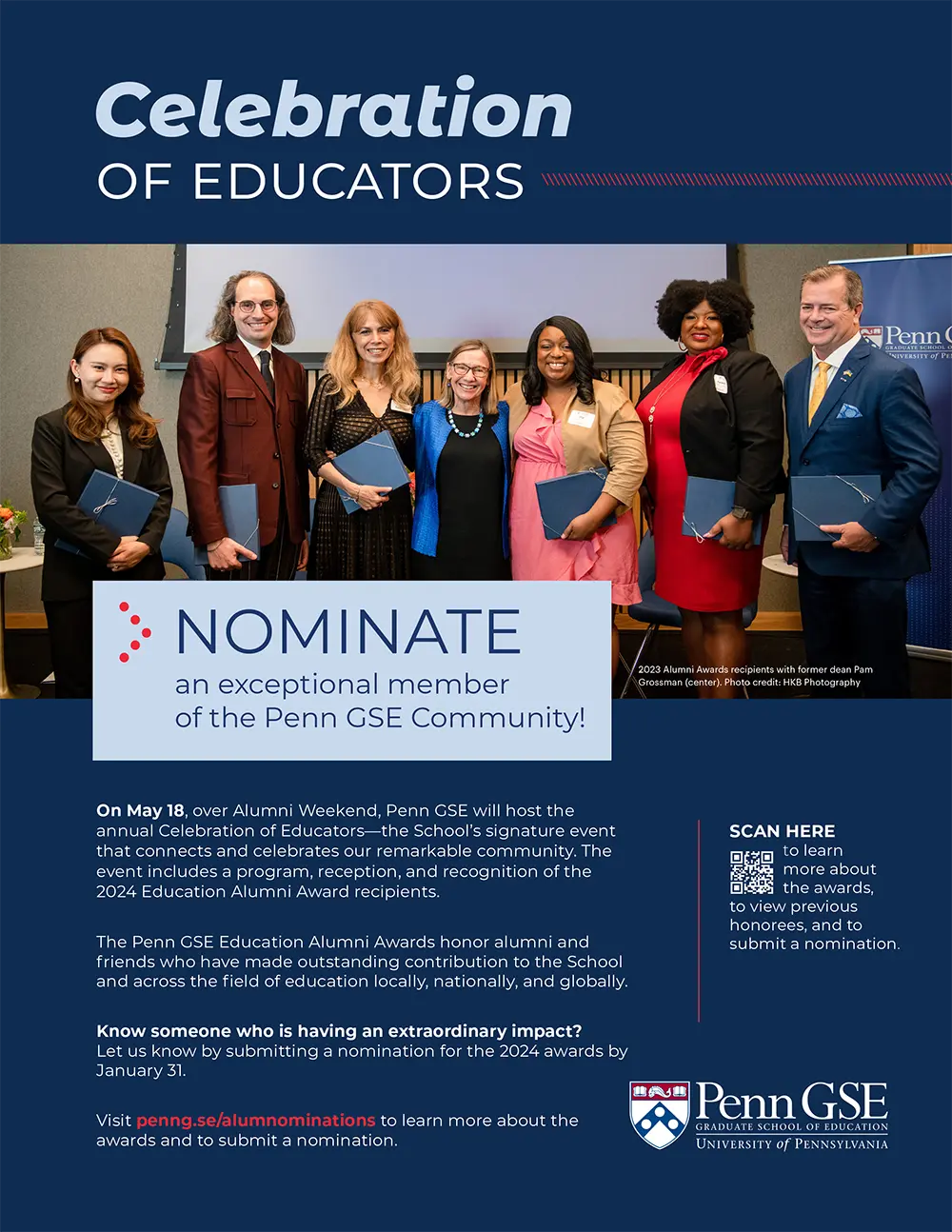Penn GSE Magazine Fall/Winter 2023

Contents
NEWS
\
HOMEROOM
\
FEATURES
\
NOTEWORTHY
\
RECESS
\
Letter from the Dean

Dear Alumni and Friends,
When I received the news that I’d been offered the job of dean of Penn GSE, my family and I were on top of the world—literally. We were skiing in Colorado, and my sons and I were on top of the highest peak at Winter Park, 12,000 feet above sea level. I took out my phone to take a picture of them, and I saw the email from Penn.
I was so excited that I accidentally took my 11-year-old twins down a very steep black-diamond run full of bumpy moguls. I realized how arduous the run was only once we had made a few too many turns to go back. So, I took a breath, plastered a determined smile on my face, and led the boys down the mountain. When we made it to the bottom unscathed, I pointed up and showed them what we had done—what they had just accomplished. Then we went inside, found my husband, and told him the news, both about the skiing challenge we had overcome together, and my exciting new job that would bring us all to Philadelphia.
Since arriving on campus over the summer, I’ve thought about that afternoon a lot. In many ways, that ski run with my kids is an important reminder of the work we are doing here at Penn GSE and why we do it. Trying new and difficult things is exciting, and scary, and worth it. It is easier to face challenges together than alone. And we need to take pride in the skills of those we have taught, knowing that they have not only the expertise to succeed but also our support to help them along their path.
News Briefs

Charlotte Jacobs (right) with Oprah Winfrey in South Africa. Photo courtesy of Charlotte Jacobs.
Trauma-Informed Practice with Oprah
In July, Charlotte Jacobs, GR’17, director of the Penn GSE Independent School Teaching Residency program and co-director of HEARD: the Hub for Equity, Anti-Oppression Research, and Development, traveled to Johannesburg, South Africa, for the Oprah Winfrey Leadership Academy for Girls (OWLAG) conference. The meeting, “What Happened to You: Understanding the Impact of Trauma on Learning, Teaching and Psychological Functioning,” centered on trauma-informed practice (TIP), which examines how adversity, background, and lived experiences shape a student’s development and learning.
“Education doesn’t make a whole person,” said Jacobs, who serves on OWLAG’s board of directors. “It is not just the academics that are important for growth and development. You must also understand where the students come from mentally, emotionally, and spiritually.”
After 10 years of integrating TIP into its own program, OWLAG is creating a framework to empower educators and practitioners to utilize the practice. “[The group is] at a point now where they want to share their learnings and practices with folks outside the school,” said Jacobs. “As more people become informed and learn, the hope is it will spread.”
Policy Corner
The Headline
U.S. Supreme Court Strikes Down Biden Administration Student Loan Forgiveness Program
The Story
The expert
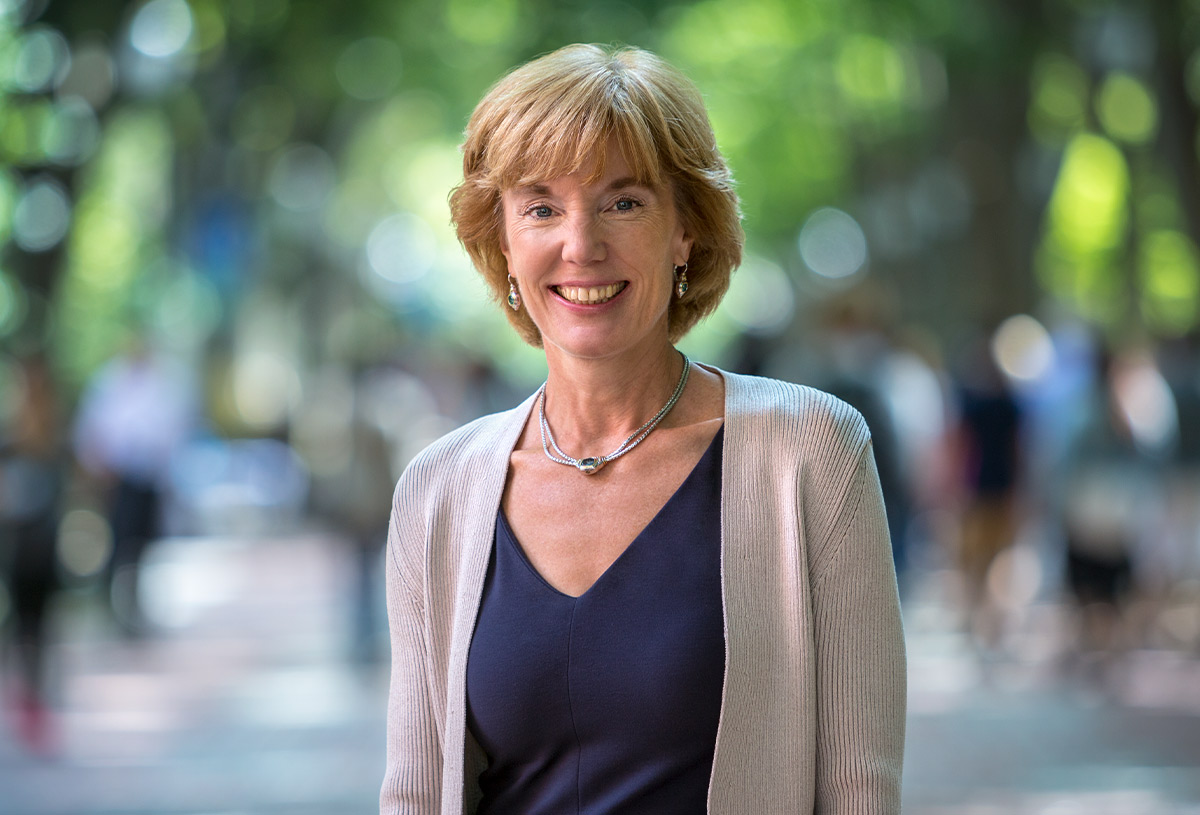
Photo credit: Stuart Goldenberg for Penn GSE
A View from Campus
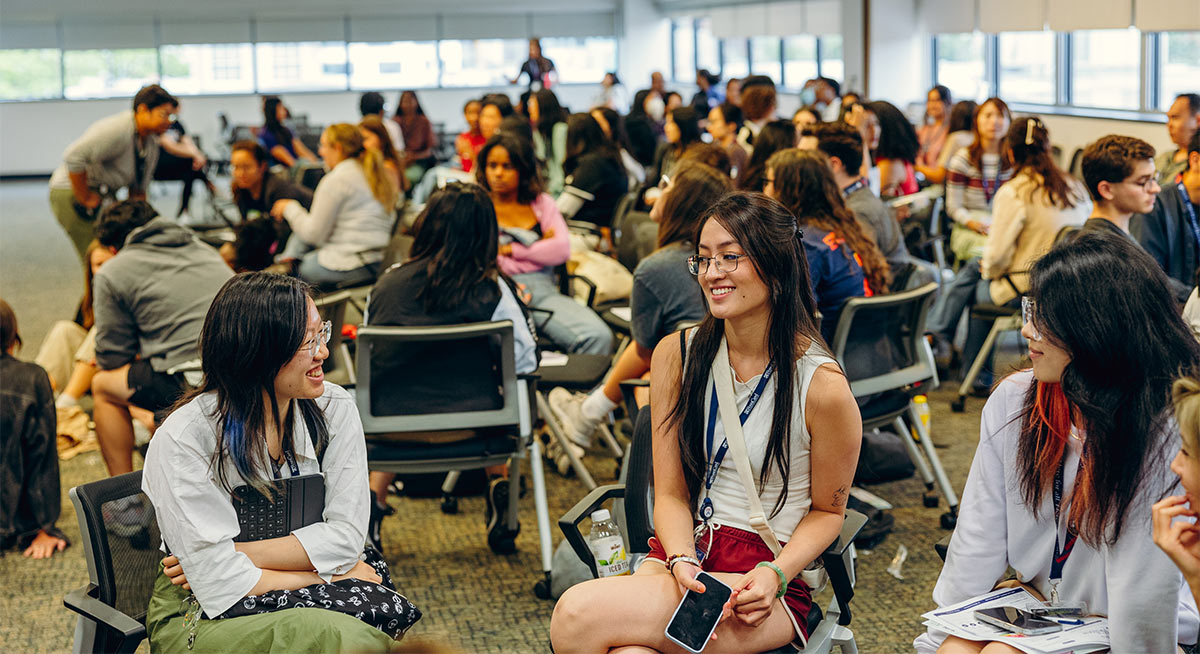
THE NEXT GENERATION
CELEBRATING NEW BEGINNINGS
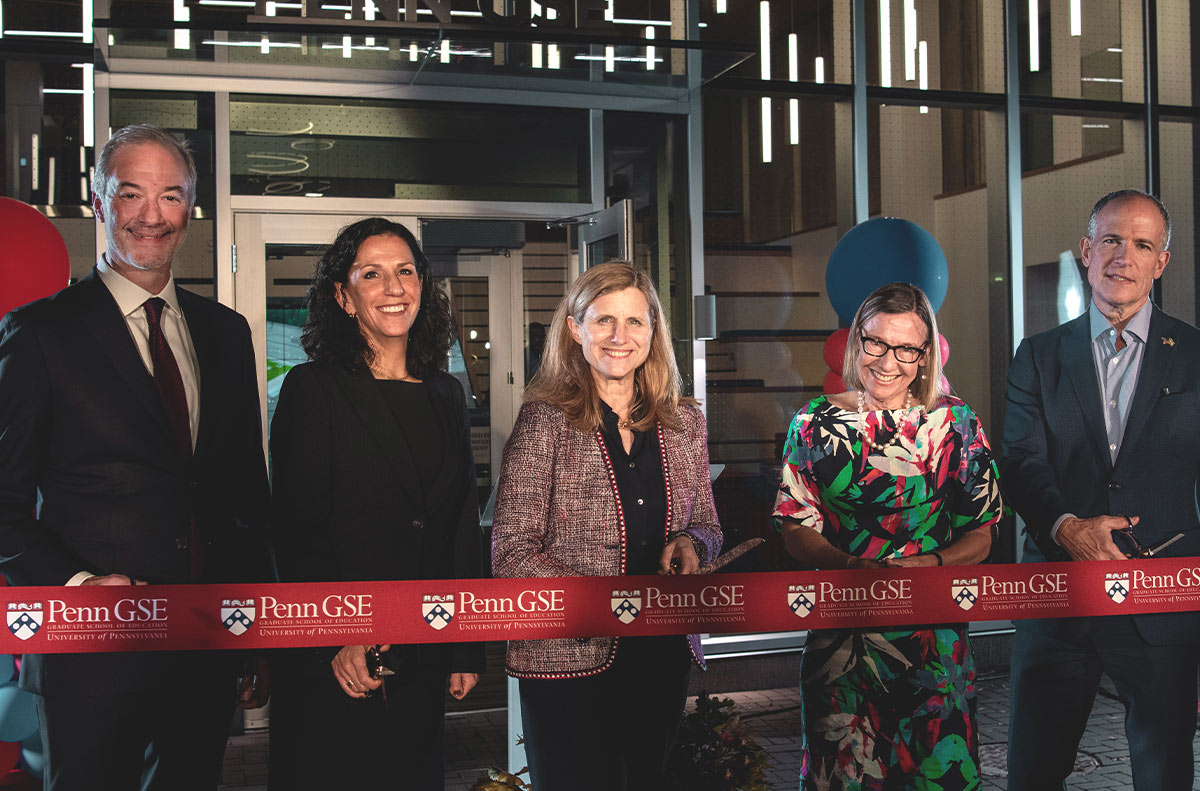
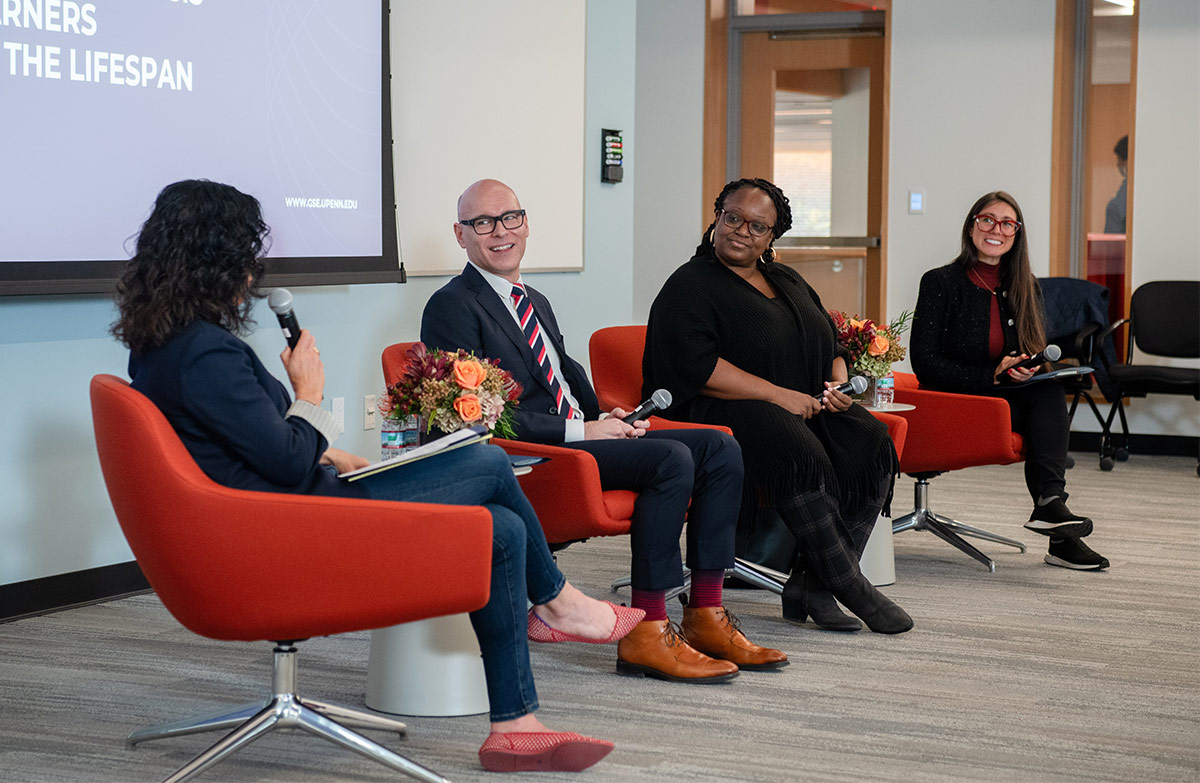
SPOTLIGHT ON MENTAL HEALTH
Homeroom
How a space is organized and outfitted for optimal learning and inclusion is important to her. After finishing her two master’s programs at Penn GSE (in teacher education and language and literacy), Cortes earned her PhD in education at the University of California, Berkeley, where her dissertation explored how Afro-Puerto Rican mothers create learning environments for their children that center Blackness.
“That’s what I’m trying to do in my work here,” said Cortes, who is also teaching “Applied Linguistics in Education” at GSE this semester. “It’s really important to me to bring Afro-Latinidad into conversations in a Latine cultural center. . . . I want us to really think about the multiplicity within our understanding of Latinidades. How do we do that, not only through programming, but how we do that in our interactions with students? How we do that in the ways that our space is designed?”
That care and intentionality is obvious throughout her office and at La Casa. She gave us a tour of everything from the personally meaningful art she’s hung on her walls to the snack closet she keeps stocked with condiments—Valentina hot sauce, Tajin chili-lime seasoning, adobo seasoning—to remind students of a taste of home.
Our Alums in Their Spaces
Our Alums in Their Spaces
How a space is organized and outfitted for optimal learning and inclusion is important to her. After finishing her two master’s programs at Penn GSE (in teacher education and language and literacy), Cortes earned her PhD in education at the University of California, Berkeley, where her dissertation explored how Afro-Puerto Rican mothers create learning environments for their children that center Blackness.
“That’s what I’m trying to do in my work here,” said Cortes, who is also teaching “Applied Linguistics in Education” at GSE this semester. “It’s really important to me to bring Afro-Latinidad into conversations in a Latine cultural center. . . . I want us to really think about the multiplicity within our understanding of Latinidades. How do we do that, not only through programming, but how we do that in our interactions with students? How we do that in the ways that our space is designed?”
That care and intentionality is obvious throughout her office and at La Casa. She gave us a tour of everything from the personally meaningful art she’s hung on her walls to the snack closet she keeps stocked with condiments—Valentina hot sauce, Tajin chili-lime seasoning, adobo seasoning—to remind students of a taste of home.
Photo credit: Joe McFetridge for Penn GSE
Ask Me Anything: Katharine Strunk

Beyond her professional accomplishments and extensive CV, who is Penn GSE’s new dean?
by Rebecca Raber
Photo credit: Joe McFetridge for Penn GSE
hen Katharine Strunk joined Penn GSE as dean in July, she brought with her decades of experience as an educator, policy researcher, and expert on teacher labor markets, school and district improvement and accountability, and student achievement. But Dean Strunk is more than just her many accomplishments. In the year ahead, we will have much to share about the new dean’s vision for the School’s future, but first, we hope this Reddit-style AMA (Ask Me Anything), will help you get to know the woman behind the work. Sourced from Instagram—are you following @penngse?—and from folks across campus, these questions represent some of the silly and serious things our community wanted to know about its new leader.
PENN GSE: What’s the first word you think of when you think of Penn GSE?
KATHARINE STRUNK: Impact.
GSE: Why?
KS: Because one of the things that drew me to Penn GSE—and that has been clear to me from the conversations I’ve been having with faculty and staff and students—is that everybody here wants to make a positive impact on the world, whether it be through kids in schools, through kids in community programs, or through [supporting] educators or leaders. That is the defining focus of GSE: how do we make positive change?
The Mental Health Crisis in Schools

n the Tuesday after Labor Day, Eric Brown, GED’16, a school counselor, welcomed students back to Horatio B. Hackett Elementary School in Philadelphia’s Fishtown neighborhood. “There are some students who are new to the community, and some whom I am reconnecting with,” he said. “I hang out with them during lunch and recess and visit them during art class or music.
“I want to make sure they know that support is available to them,” he said.
Even before the pandemic, he saw students of all ages struggling with mental health issues. “For some of them it’s just school stuff, grades,” he said. “I saw fourth and fifth graders spiraling over politics and elections.”
Faces of Philanthropy

his fall, Penn GSE unveiled its first new construction in over 50 years. Driven by the growth in student population, which has more than doubled since the last renovation two decades ago, and a need for more student-centered, collaborative space, the capital expansion project connected the two 1960-era buildings in which the School makes its home (Stiteler Hall and 3700 Walnut Street). The now-linked buildings add 16,200 new square feet to GSE’s footprint and include another 16,900 square feet of renovated space.
But this project, begun in April 2022 and finished this summer, is more than just an expansion. It’s a physical manifestation of Penn GSE’s priorities and values. It brings most of the School’s people and programs together under one roof for the first time in its history, fortifying the School’s commitment to “One Penn GSE.” It prioritizes collaborative spaces to bring people together to help solve 21st-century educational challenges. And it includes technology-rich spaces—like the Andrew and Marina Jacobson Innovation Studio and the Gregory and EJ Milken Makerspace—because advancing education in novel and meaningful ways demands innovation and technological expertise.
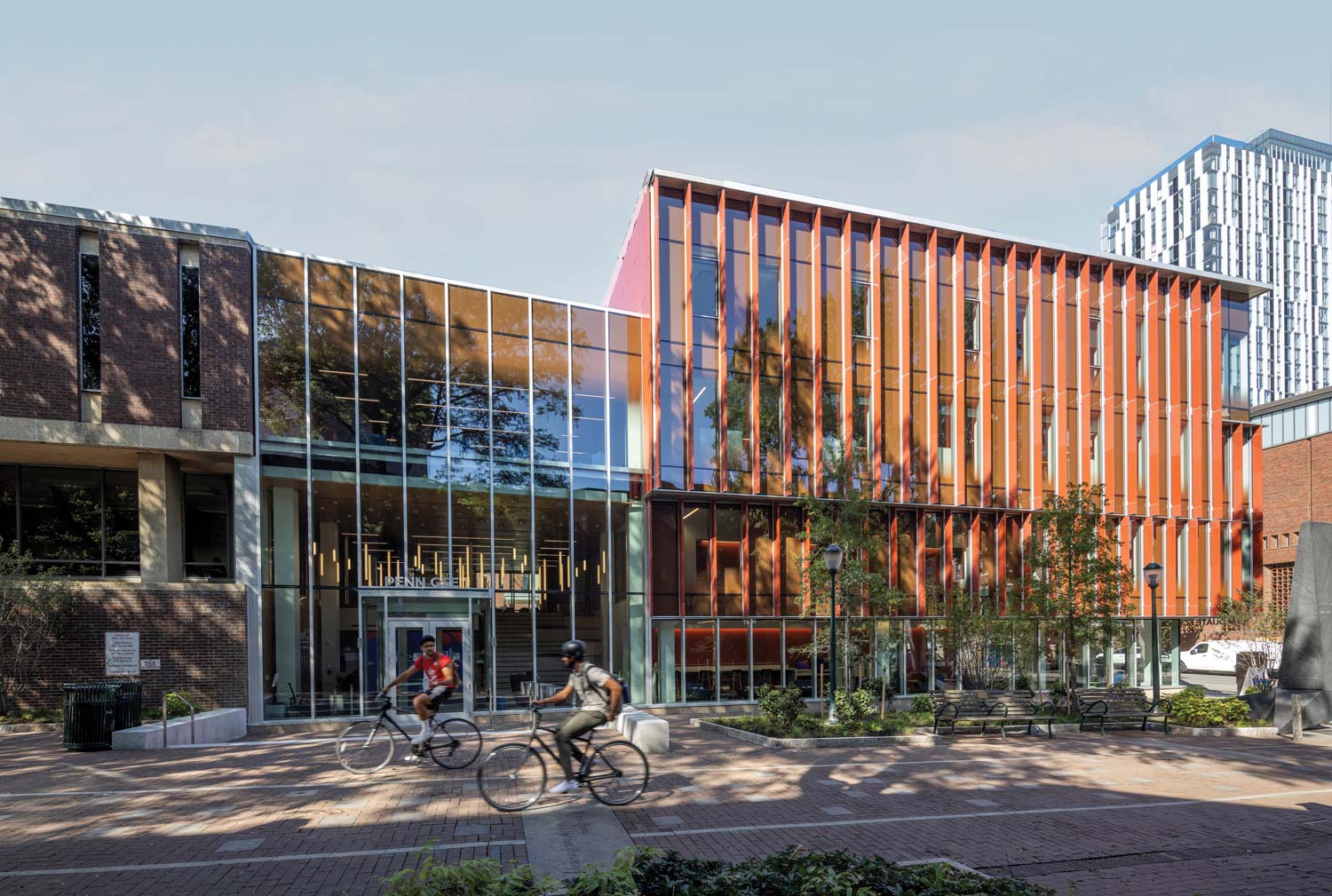
Take a Look, It’s in a Book

hile teaching music to young children at an independent school in Brooklyn over two decades, musician Carolyn Sloan, GED’17, was shocked to discover that many had never heard a symphony.
At the same time, she was reading books about music to her young son and was disappointed she couldn’t find any that offered a concrete, kid-friendly understanding of musical concepts, that played the sound of an instrument or, say, a melody. “Why would you make a book about a violin,” Sloan said, “without any sound? It’s very abstract to a little one who doesn’t know what a violin is.”
So grew a seed of an idea that has blossomed over the years into a series of fun children’s books that introduce the orchestra, jazz, and opera (so far)—complete with sound buttons. Her first, the 2015 award-winning Welcome to the Symphony (Workman Publishing Company), uses Beethoven’s Symphony No. 5 to explore the orchestra and plays snippets of not only the major instruments but also key concepts such as the main theme, melody, and the famous da-da-da-daah end of the first movement.
Back Where She Began
enn GSE’s A. Brooks Bowden isn’t just a faculty member, she’s also a proud alum. An associate professor in education policy, she earned her master’s degree in educational policy at the School where she now trains the future of the profession. In a nice bit of symmetry, her current office on the fourth floor of 3700 Walnut Street formerly belonged to her mentor, Professor Emerita of Education and Social Policy Rebecca A. Maynard. “That was intentional,” said Bowden, who credits Maynard’s “Economics of Education” class as an early inspiration for her professional path.
Since graduating from Penn GSE, Bowden earned her PhD at Columbia University, conducted research at the Center for Benefit-Cost Studies of Education—a center now housed at Penn that she directs—and joined the Penn GSE faculty, where she earned tenure earlier this year.
Her research focuses on program evaluation and economic analysis with the aim of mitigating poverty-related challenges that prevent students from experiencing the full value of schooling. She co-authored the primary text on cost-effectiveness, Economic Evaluation in Education: Cost-Effectiveness and Benefit-Cost Analysis, and is an editor of the journal Educational Evaluation and Policy Analysis.
Alumni Notes
-
Alumni Bookshelf
 denotes alumni authors whose latest book is featured below.
denotes alumni authors whose latest book is featured below.
-
Penn Affiliations
At Penn, all alumni have an affiliation—a series of letters and numbers following their name to indicate their degree, school, and year of graduation. A master’s degree from Penn GSE is represented as GED and an education doctorate as GRD. A philosophy doctorate from any school at Penn is represented as GR. An undergraduate degree offered by the School of Education until 1961 is represented as ED. The two numbers following the letters represent the year in which that degree was completed.
-
1970s
- Myrna Skobel Agris, CW’63, GED’73, GRD’79,
was promoted to vice president at Morgan Stanley. - Craig E. Burgess, GED’71, was recently elected president of the Premier Cadbury Continuing Care Retirement Community Residents’ Association in Cherry Hill, New Jersey. His latest book, A Fleeting Glimpse of Paradise, features Hawaiian culture, history, music, art and lifestyles.
- Miriam Camitta, CGS’71, GED’72, GR’87, earned an MFA in fiction from Bennington Writing Seminars after retirement. Her personal essays appear in The Masters Review and Fourth Genre literary magazines. Her essay “Necessary for Life” was selected as notable in The Best American Essays 2023.
- Alice Korngold, CW’74, GED’77, published her third book, A Better World, Inc.: Corporate Governance for an Inclusive, Sustainable, and Prosperous Future (Palgrave Macmillan).
-
1990s
- Courtney Allison, GED’96, currently serves as a curriculum expert at EdReports.org, where she builds tools to evaluate materials and works with teachers across the country to produce informative reports. She is also doing research on AI and its implications for future classroom materials.
- Athena Anthopoulos, C’86, GED’93, is the founder and principal of Main Line School Match in Pennsylvania. With an extensive background in early childhood and elementary education, she has taught and guided children and families on the Main Line for over 25 years.
- Anna Beresin, GRD’93, is an incoming Fulbright scholar at the University of Sheffield in the United Kingdom. Her free new book, Play in a Covid Frame: Everyday Pandemic Creativity in a Time of Isolation, is available via Open Book Publishers.
- Jennifer Cressman, GED’92, GR’05, has joined Penn State Abington as chair of the Early Childhood and Elementary Education program and director of Teacher Education.
- George Steinhoff, GED’97, has been reappointed as superintendent for the Penn-Delco School District in Delaware County, Pennsylvania—a position he has held since 2008.
- Vincent Travaglione, GED’98, recently founded Agile Enrollment Solutions (AES), a consulting firm that mixes best practices from the project management and enrollment management fields. AES is focused on supporting enrollment management teams in creating foundational, sustainable operations and comprehensive documentation.
-
2000s
- Jake Becker, GED’02, currently serves as the managing director for specialized health services for Public Health Management Corporation in Philadelphia. He was previously the head of school at The City School and CFO at Esperanza Health Center, both also in Philadelphia.
- DeAngela Burns-Wallace, GRD’09, began her role as the new president and CEO of the Ewing Marion Kauffman Foundation in August. Located in Kansas City, Missouri, the Kauffman Foundation provides access to opportunities that help people achieve financial stability, upward mobility, and economic prosperity regardless of race, gender, or geography.
- Sandra Every Dean, W’59, GRD’06, has published a new book, Beyond Civics: The Education Democracy Needs. She writes, “Failure to teach civics is often blamed for the problems facing democracy. But civics alone is not enough to prepare young people for the hard work of sustaining a democratic society. It is not enough to learn how a bill becomes law. Rather, a school should itself be a democratic ecosystem where young people have the opportunity to observe and practice those skills and dispositions required to be an engaged and informed citizen.” Every Dean was head of the Philadelphia School from 1983 to 2006.
- Dean Donaher, GRD’09, was appointed principal of Bethlehem Catholic High School (Pennsylvania) on July 17, 2023, by the Most Reverend Bishop Alfred Schlert.
- Pamela Felder-Small, GRD’05, facilitated an official side event panel on reparatory justice for the United Nations Permanent Forum on People of African Descent on the occasion of the 75th anniversary of the Universal Declaration of Human Rights.
- Monique Robinson, GED’08, did humanitarian work this summer with Action Against Hunger in Nairobi, Kenya, educating mothers about malnutrition prevention and horticulture.
- Allison Rodman, GED’05, GED’09, released her second book, Still Learning: Strengthening Professional and Organizational Capacity, with the Association for Supervision and Curriculum Development (ASCD). This thoughtful guide offers a framework for creating and sustaining learning organizations where both students and educators can truly thrive.
- Mimi Romeo, GED’ 01, spent 22 years as a classroom teacher and is now an ESOL teacher, working with students in kindergarten through fourth grade. Her primary role includes supporting English language learners with their grade-level content, while using scaffolds so they can access the curriculum.
- Hanadi Shatara, GED’09, taught in Philadelphia until 2014. She received her doctorate at Teachers College, Columbia University in 2020 and then became an assistant professor at the University of Wisconsin-La Crosse.
- Michiko Uryu, GED’02, is an assistant professor at San José State University in California. She has been teaching Japanese language and culture for five years. She has also been conducting and presenting her research on intercultural communication in the global age and ideological issues relevant to Japanese heritage speakers in the U.S.
6 Ways
EDUCATORS CAN CREATE INCLUSIVE CLASSROOMS
tudents bring different experiences, talents, and abilities into every learning environment, but not all classrooms are set up to welcome that diversity. Assistant Professor María Cioè-Peña, a former bilingual special education teacher and author of the award-winning book (M)othering Labeled Children: Bilingualism and Disability in the Lives of Latinx Mothers, has some advice to help change that.
Below, she offers six ways educators can embrace diverse learners in a single classroom, whether they are multilingual, differ in their mobility levels, are neurodivergent, or are otherwise differently enabled.
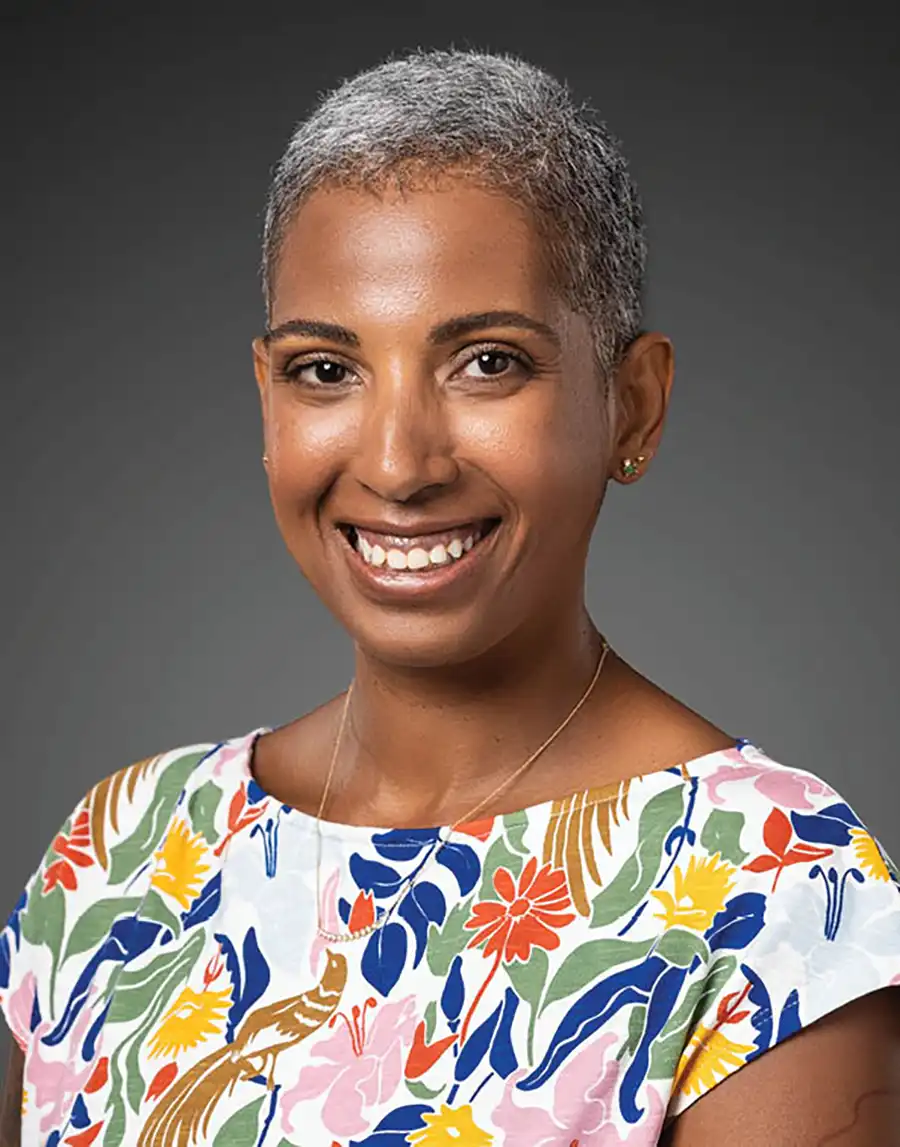
María Cioè-Peña

Board of Advisors
Jeffrey S. McKibben, W’93, Chair
Deborah L. Ancona, C’76, GED’77
Olumoroti G. Balogun, GRD’20
Brett H. Barth, W’93
Allison J. Blitzer, C’91
Harlan B. Cherniak, W’01
Jolley Bruce Christman, GED’71, GR’87
Samara E. Cohen, C’93, W’93
Beth S. Ertel, W’88, WG’92
Evan S. Feinberg, W’09
Jeffrey L. Goldberg, W’83, WG’89
Patricia Grant, GED’01, GRD’04
Joel M. Greenblatt, W’79, WG’80
John A. Henry
Heather Ibrahim-Leathers, W’95
Andrew H. Jacobson, WG’93
Douglas R. Korn, W’84
Gregory A. Milken, C’95
Andrea J. Pollack, C’83, L’87, GED’17
David N. Roberts, W’84
Francisco J. Rodriguez, W’93
Molly P. Rouse-Terlevich, C’90, GED’00
Michael J. Sorrell, GRD’15
Navin M. Valrani, W’93, GED’18, GED’22, GRD’23
Steven M. Wagshal, W’94
Katharine Strunk
Dean
Laura Tepper
Publisher
Rebecca Raber
Editor
Editorial Board:
Umar Aly
Sylvia Davis, C’20
Amanda Ellis
Jane L. Lindahl, GED’18
Melanie Hieronimus
Jennifer Moore
Kat Stein
Copyedited by Colleen Heavens
Cover Photo: Greg Benson Photography



